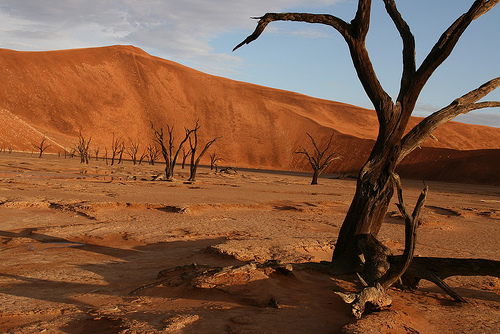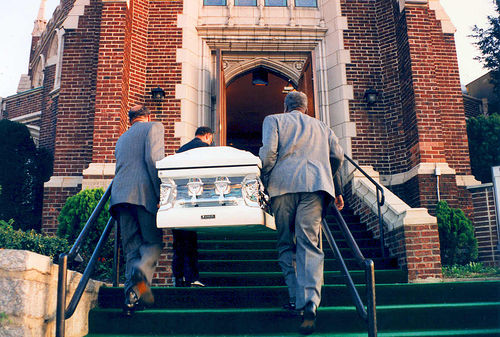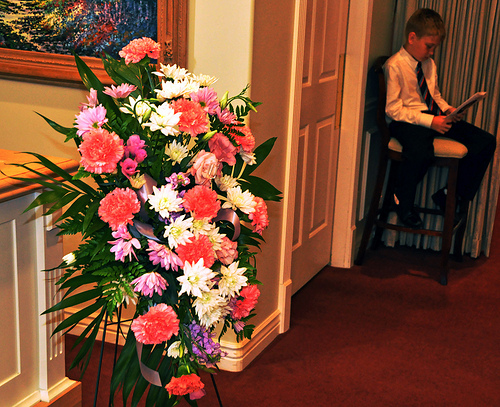In America today, it has become culturally acceptable to pretend that life is endless, youth is chase-able, and death for “good” people is something that happens far away behind closed doors and attended to by specialists. This mass hallucination about the reality of our biological life cycles has led to a number of troubling actions on the part of, well, just about everybody.
When my mother first got sick, her doctor sent us away time and time again, first with a shrug, then with mounting irritation as we returned for complaints she believed were symptoms of bad self-care. My mother drank and ate comfort food. So, when she began vomiting after every meal or sleeping 17 hours a day, she received no sympathy from medical professionals or even her own siblings. My aunts called and left messages saying that the best thing I could do was to leave her alone. Illness was far from the forefront of their consciousness. It was easier for people to detach from “bad” behavior and dangle the death as a warning, rather than really look at my mother’s symptoms.
As a society, our general policy seems to be that if we ignore death, we are somehow sparing ourselves. It is considered perfectly acceptable for otherwise competent adults to break down completely in the face of illness and death. The ones that do take over … they are expected to understand that it's no one's fault that they are on their own … some people just can't handle it.
What if, instead, death was culturally as much a part of life as being born? Could we, as a culture, choose to make the process less frightening and less lonely? If we have that option, why do we choose to isolate those dealing with death? Is it really a conscious choice?
In an era of health cuts, poorly paid hospital staff, income needs driving unqualified people to accept care-giving jobs they aren’t trained for, and diminishing assistance from hospice in poorer neighborhoods, some of that isolation is clearly economic. Many people would say to me when Mom was sick, “Why are you so tired … don’t you have hospice?” What many don’t realize is that hospice is privately funded to an extent and that rich hospitals in rich neighborhoods provide more/better services than poor ones. Money, or a lack thereof, left us looking for a wide variety of alternatives.
My partner Jasper and I have never been wealthy. We are accustomed to a D.I.Y. lifestyle. A sense of self-reliance permeates everything. We have always participated in an underground economy predicated on labor trades, barter, and a general ethos of helping those who need it. In the case of caring for a dying loved one, that system fell short in more than one instance. The community we could count on for vegan meals or help learning to fix our car was ill-prepared to provide support in dealing with such a difficult and culturally unacceptable topic as end-of-life care.
I suspect that many more children of the Baby Boomer generation will be called upon to re-examine our cultural relationship with illness and dying in these harsher economic times. The family caregiver will once again take the place of nurses and “retirement homes,” not because we want to or are even well-prepared to do so, but out of economic necessity.

A lone tree in Death Valley, California. Photo credit: Michiel Van Balen. Used under Creative Commons license.
While there is much to learn in this new era, there is also much to be gained by bringing back our sense of collective compassion and respect for humanity at the end of life. This process begins with education. We must begin to pull back the curtain and understand the process of death and dying on the biological, cultural, economic, and social levels. It is a universal experience and, as such, deserves recognition and respect. A suspension of fear, a rush of compassion … these are only the first steps toward a whole human response to dying, steps that may eventually change the experience of death for the living, as well. As with anything, though, you have to crawl before you can walk. So let’s start with tackling the fear.
When I tell people that my parents are dead it takes them a moment to regain their composure. Only the bravest manage to peek up at me from beneath uncomfortable expressions to tentatively ask me, “How?”
“Cancer,” I say. Their discomfort makes me uncomfortable. It is work to maintain a blank face and a strong voice.
The next part of this interaction involves a hint of relief that it wasn't them as I am asked the follow-up question that I know is coming: “What kind of cancer?” I dread this part of the conversation because “What kind of cancer killed your dad?” is actually code for “Was he asking for it?”
My answer, “lung cancer,” usually tampers down the pitying looks and replaces them with smug satisfaction until I follow it up with, “but he never smoked.” That brings the conversation back around to worried looks and rapid endings. Then, if I'm feeling especially self-righteous I usually throw in, “And my mom died of brain cancer,” just to see what expression it evokes on the face of a nosy stranger.
The recent death of singer Amy Winehouse prompted a surge of responses from fans and detractors alike both in the traditional press and on social media sites and blogs. The most horrifying were the ones that shrugged off her death as something she deserved or had been asking for, as if dying young was her punishment for a life lived outside the rules.
In the attempt to process another person’s death, we find ourselves faced with a series of questions: Whose fault is it? Could I have prevented it? What can I do differently to avoid the same fate? These thoughts come up whether the dying person is a friend, a relative, or even a celebrity described in the newspaper.
The biggest question for me – after dealing with the fallout of some of these contemplations – is this: Does it really mean anything to answer those questions? I mean, really; what does it matter if someone's death is a result of carelessness, rash action, or anything else that might be construed as a fault? As the old joke goes, “No one here gets out alive.” Sooner or later, no matter how responsible or cautious, no matter how much oat bran you eat or yoga you do, the dying party will be you. It will also be the people you love.
Armed with this perspective, it is time to conquer our fear and start learning to deal with death on a realistic level. With the economic changes in the world, this is going to have to include a real conversation about shared responsibilities in caring for family and community members.

A casket is carried into a church. Photo credit: Elvert Barnes. Used under Creative Commons license.
My story illustrates a few of the lessons learned regarding the hazards of limited cultural information on illness, death, and how to give care.
Just before she was diagnosed, I left my mother alone for 10 days on the urging of my family to work in Los Angeles. To my aunts, I was a huge burden on her. I lived at home and didn't pay rent. Driving mom to work and cooking her meals every night was nice and all, but, according to them, the best gift I could give my mom would be the knowledge I was making money somewhere. Caregiving for a person who wasn’t dying (that we knew of yet) was deemed unhealthy behavior on my part. For my partner and myself, it was just a different kind of economic transaction.
When I came home, ready to drop from exhaustion after 10 straight days on a film set, I noticed all the lights were off. I flipped a switch and couldn't quite take it all in. The fish tank was moldy with all the fish floating at the top of the tank. There was an inch of standing water on the floor and it was at least 90 degrees and humid in the house. A dead rat stared at me, its lifeless eyes and sopping fur crowning the dining room rug while a cat stalked it slowly, meowing about its empty food dish. My mother was staggering around, falling down, eating a moldy peach, and screamed hysterically when I tried to take it away from her. No one had checked the mail or retrieved the newspaper in the 10 days I was gone. Clearly, no one had thought to check on her.
Several hours of yelling, sitting on hold, begging, and waiting later, my mother finally had an appointment for an MRI. She insisted I go to another job interview. She said she would finally go to the hospital if I would go to the interview. Against my better judgment, I said okay. My best friend agreed to take her to the appointment. The next day, the phone call came. “It's a tumor, hon,” my friend whispered. “A brain tumor.”
I went straight to the hospital where a teenager in a white coat who claimed to be my mother’s brain surgeon waved papers in my face, telling me she would die if I didn’t sign them. So I signed. That’s the first lesson. We found out later that other options, potentially less painful ones, had been available but were never presented. Without a large network of calm people who could help sort information, a choice was made quickly and without enough discussion.

A young mourner sits near a bouquet of flowers in a funeral home. Photo credit: Berkeley T. Compton. Used under Creative Commons license.
The first surgery almost killed her, so the surgeons did what they knew best and performed a second surgery eight hours after the first. This one left her paralyzed for what was to be the rest of my mother's natural life – all 11 months of it. What followed is the stuff of many more stories – most of them heartbreaking, some of them funny, and all of them beautiful in their own way. Every decision we made falls into the category of We Did The Best We Could. I can live with that. I know there is room for improvement, and it starts with education and preparation.
During that time, I learned the hard way that judgmental attitudes about behavior and death applied to me, too. Every time I asked my mother’s sisters for help, the response was, “You know, hon, she'd be better off in a home with people qualified to care for her.” To them, it was easier to imagine she was beautifully cared for by magical doctor elves than to face the very real needs of an ill person who was no longer one that they could recognize. I understand; fantasy is nice. It doesn’t really apply to those of us living check-to-check, though. This idea that, when something is hard or harsh or ugly, we can – and should – pay someone whatever it takes to make it go away is something we, collectively, need to get over.
There were also people around who couldn’t or wouldn’t help with caregiving, but who helped care for us. This was an even better lesson: burdens shared are lighter. Having one hour a week to talk to someone who would listen, to cry and rail against the injustice of it and offer a hug or a sympathetic ear … well, that job doesn’t require much training – just the will to do it.
This community – which was not our neighborhood, not hospice-based, and not a medical one – came together to help. All of these people and their small acts of kindness and generosity are what made it possible to survive the process. And it changed me. Lesson number three was this … caring for caregivers is as vital as caring for the sick; and it takes a whole community. It takes a whole community to help someone leave the world, surrounded by love and comfort.
The way I was raised, it was rude to open someone else’s fridge. You never asked about money. You never looked at another person's bills and always pretended you just couldn't see the stack of dirty dishes in their sink. That’s just good manners. How I grew up … you were on your own and expected to throw a cocktail party while you quietly, without bothering anyone, went down with the ship when it was sinking. With apologies to my grandmother who lived and died by these rules as the holy grail of social niceties, this is asinine, and it doesn’t work for most people.
I propose we all give up being nice and just get nosy. Drop by unannounced. Bring food. Clean up the dirty dishes in each other’s sinks. Ask questions and listen to the answers. Offer to research. Write things down for each other. Share. Put stuff away. Organize each other’s bills. Help Where We Can. It's a small change in me, but, on a cultural level, has the potential to change the whole world.









